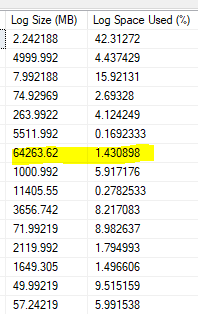The setting for the transaction file 'size' in the database options is the minimum size that file will ever get, correct?
Yes, unless the logfile "size" in the database properties under files is adjusted, the actual value should never go below this amount after backups, restarts, etc.
Is the dbcc sqlperf(logspace) query an appropriate measure for adjusting and setting the log file size on the database options?
Yes, but keep in mind that is a only a snapshot of the file at that point in time. Getting a history of the command over time and at the application's peak usage would be a better indicator of how much space the log really needs to prevent it having to grow.
So I will never see a log file size smaller than 64GB. Correct?
Correct. If you feel this is inflated, and the database log will never need to grow to this amount, it could be adjusted smaller as you say to 4gb. The point of this setting is to avoid a performance hit should the file need to ever grow which setting it at a high value initially prevents this.

